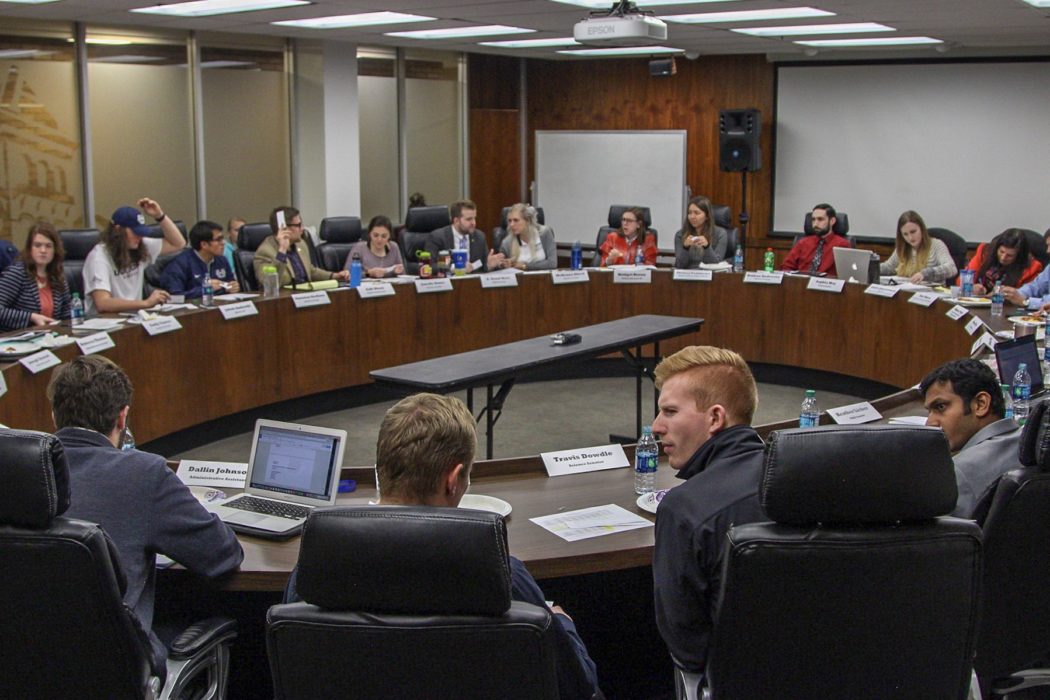Reactions to athletics fee results show range of priorities, opinions
Student fees at Utah State University are set to increase $5.05 this year — $3.11 for the technology fee and $1.94 for athletics.
After weeks of debate, the USU Student Fee Board voted to decrease the proposed athletics fee from $8 to $1.94, but it was divided 15-7-1 on that decision.
Student body officers, administrators and students on both sides of the issue offered their takes on the merits of the fee compromise.*
John Hartwell, vice president and director of USU athletics
 Utah State University
Utah State University “While we are grateful to the Student Fee Committee for the $1.94 per semester increase approved for the Student Athletic Fee, we are disappointed that the $8.00 increase we requested was turned down. The increase is the first increase in the Student Athletic Fee since FY2016, and represents a 1.4% increase. We believe that Intercollegiate Athletics is such a vital component of the overall student experience on our campus, and would hope that our student body supports that notion through their attendance at our various athletic contests and the continued support of our Student Athletic Fee. Athletics will continue to be responsible stewards of this revenue source by providing the tools necessary for our 400+ student-athletes to be successful in the classroom, on the fields of competition, and ultimately in the game of life.”
Michael Scott Peters, president of the USU student association
Peters said he supported all three proposals as presented at the board’s first meeting.
 Utah State University
Utah State University “With respect to Athletics, I believe it is essential we look at the bigger picture and understand the important role that our athletic programs play for students, faculty, and alumni. John Hartwell and Coleman Barnes expressed, “Our number one goal is to graduate student athletes.” The top priorities for the $8 increase were to help cover scholarships, travel, guarantees, recruiting, game expenses, and medical. In other words, this is a way for students to help other students with a promise from Coleman to “do more with less.” I was encouraged to hear that this fee would provide greater support to teams like gymnastics, softball, and cross country to travel to competitions they would not normally have the opportunity to attend. I appreciate the transparency and responsiveness our athletics administrators have provided to our student body, and I encourage all students to keep an open mind with regards to needs-based fees. Remember, this is an investment in the future of our university.”
Jakob Ambuehl, athletics and campus recreation vice president
 Utah State University
Utah State University “I thought that Fee Board went well. I think lively and heated debate can be important and beneficial. I think it digs to the root of discussion and brings to surface the motives of our fee board members. Although I am in support of the $8 increase, for I see that it is a need for our athletics to keep up with inflation, remain competitive at the division 1 level, and continue to build the brand of USU, I recognize and support that we are the voice of the students here at USU. And if they do not want an increase, then that’s why the fee board went the way that it did. So I am happy with the outcome, I am happy with the way our officers represented the students, and I am happy for the $1.94 increase towards athletics. All in all, it was great year of fee board!”
Chelsea Yoshikawa, organizations and campus diversity vice president
Yoshikawa serves on the Athletics Gender/Minority Subcommittee and argued for an increase based on the idea that it would benefit athletes that might not typically see as much funding as teams that typically see more monetary support.
 Utah State University
Utah State University “In terms of whether I’m pleased with the outcome, it’s tough to say! Athletics receives such a large fee from students already. And with more money, requires both responsibilities. I’d love to see more money be put into athletics to help aid an increase of women and minorities within the athletics department. I believe an increase of athletics performance would help USU as a whole, but unfortunately with fee increases there’s no way to guarantee where money will be spent!”
Bridget Brown, student advocate vice president
 Utah State University
Utah State University “I’m medium-happy, leaning neutral with the decision. The general response from students was not to increase the Athletics fee and I didn’t like that our vote went contrary to that. I wanted my vote to be guided by student input, but also considering the presentations and debate I took part in during the meetings. When looking at the increase from a business perspective it occurred to me that the Athletics program needs more funding for operating costs–travel, scholarships, etc.–and competitiveness in the 2018 athletics market. I hope the fee increase allows USU to be more competitive in our region and as a program as a whole. The increase doesn’t directly benefit the entire student body now, but I hope it encourages success and functionality in our athletics program and increases rapport for our school down the road.”
Heather Lieber, College of Agriculture and Applied Sciences senator
 Utah State University
Utah State University “The final decision made reflects a compromise between differing ideas, and for that reason I feel it was a success. I appreciated all insights and information offered on the subject in these meetings. As a body we had a wider scope of vision than any one person could’ve had in making this decision.”
Sierra Wise, Caine College of the Arts senator
 Utah State University
Utah State University “By the very nature of student government, passionate students are voted into office. Each of us has different experiences and represents unique constituencies of the university. While we may have not all desired the same outcome, I’m grateful we were able to debate in a respectful setting and come to a solution together. I’m also grateful to work with university administration that values student input and allows for a student board to work together on important issues like academic fees.”
Cody Davis, Jon M. Huntsman School of Business senator
Davis said he, like Peters, had supported all three proposals as presented, but gave his thoughts on the outcome of debate about the athletics fee:
 Utah State University
Utah State University “A big issue discussed throughout this fee appeared to be a lack of transparency. Athletics listened to the Fee Board from the first week and made some modification to the fee proposal. They provided a breakdown of where the fees would be used to help clear up many issues with transparency. I have had a lot of experience this in the Huntsman School in regards to transparency concerns. After meeting with many administrators and faculty, my trust in administration and faculty has grown so. Just as Whitney Pugh (VP of Business & Finance) & Jakob Ambuehl (Athletics VP) expressed, I have that same trust in those individuals in Athletics like John and Coleman. Whitney even advocated for Athletics stated that they go through two audits, by the state and the NCAA.
With that, I look at it this way. This increase benefits student-athletes. As we listened I was grateful to hear that this increase would benefits those sports teams who don’t have the opportunity to compete with high caliber athletes at larger events** (including cross country, softball, etc.) This fee doesn’t only benefiting the student-athletes, but the entire university. As athletic funding increases, so does our ability to recruit high caliber athletes. With better athletes are school becomes more well recognized and with that recognition brings more donor support. Serving the Huntsman National Advisory Board I see firsthand that donor support has increased significantly because they see our students are willing to pay $157 per credit on top of regular tuition. This means our students are buying in and our donors like that. If donor see our students buying in, then they are more willing to do creating a snowball effect.
I came to this school to get a full college experience and Athletics has been a part of that. I’m happy to see that we did support the Athletics for the first time in 4 years(before I came to USU). Although I would of preferred to give them more to benefit student-athletes and the programs they are a part of, I am happy to see that we want to support our fellow Aggies.”
Erik Olson, College of Engineering senator
 Utah State University
Utah State University “I represent a College that strongly disapproved of the Athletics Fee increase. I felt like I owed it to students in the College of Engineering to represent their interests accurately. Though USUSA officers are tasked with considering both sides of any issue for the good of the broader university, the increase in the general operations budget of USU Athletics would not have any tangible benefit to the average student. One particular point that informed my decision was the ~$800K increase in student collected funds from fee reclassification in 2015-2016. This is the equivalent of a $20 fee increase. As such, I did not believe that passing an increase of the Athletics Fee (any amount) onto the students was prudent. Generally, I am satisfied with how the outcome of the Fee Board. I feel that the discussions had were heated, but stayed issue focused.
The only part that concerned me were the comments pertaining to student opinions. Several present sought to undermine the opinions of students by insinuating that students are shortsighted and “would oppose ANY fee increase.” As you saw from the survey put into the College of Engineering, this is clearly not the case. The students surveyed overwhelmingly supported the Computer Fee Increase, and overwhelmingly disapproved of the Athletics Fee Increase. While I do acknowledge that even the most necessary Athletics Fee increase would have significant push-back, the idea that students cannot be informed/be trusted to make decisions is concerning. Students should be the number one priority of every single officer, administrator, and executive at USU.
One side note: Director Hartwell and the USU Athletics Department were great to work with, and have my full confidence. They have gone to great lengths to be accountable, helpful, and informative to the Fee Board and work with members in a productive way.
In short: I am satisfied with the overall result of the Fee Board. The newly named Technology Fee will continue to be able to provide outstanding services to the student body with improved security, Student Media will be able to spend their fee money more effectively, and, while I did not vote for the $1.94 increase, the Athletics Fee was not increased by $8.”
Travis Dowdle, College of Science senator
 Utah State University
Utah State University “Unfortunately I feel that many members of USUSA are out of touch with the general student populace as a whole. I feel that I failed both my constituents and the overall student body by allowing any athletics fee to pass (even if it was just a “meager” $1.94). I’m of the opinion that many student leaders do not recognize that fee’s will NEVER be taken back, reduced, or even have strict oversight placed upon them. Once they are passed they are they new normal—and unfortunately we just give the athletics department a $72,000 increase to their “new normal”. It frustrates me greatly that this fee passed at all, and I will have it noted that I motioned two times during the meeting for the fee to be increased $0.00. There were talks after the meeting of the $1.94 increase being a fair compromise between the $0.00-and $8.00 possible range and I would refute that is a good compromise for students.
That being said, I can’t fault anyone on the board to sticking to their opinions even if it is contrary to what I believe is right for the student body. That’s the great thing about a representative government right? Sometimes you fall on the side of the vote—and sometimes your ballot is at odds with the decision at hand.”
Anuj Khasgiwala, graduate studies senator
 Utah State University
Utah State University “The fee board went well last week. I personally feel the debate was not heated at all, it was a healthy discussion with everyone putting their view and valid points about the athletics fees. I support athletics because I have seen that in lot of countries the athletes do not get enough support and lots of great talent gets wasted.
But, the raise requested by athletics department of $8 wasn’t convincing even after the new presentation presented by them. I feel the expenses along with the inflated prices were not more than $72K. I feel that the scholarships promised for other athletes and women team may still not go to the respective teams. Because when in past whenever university approved any fee raise for athletes they never gave it just for football team or men basketball. So when that fee raise for scholarships and perks was generic and it still kept the other athletes far from the perks same as other teams, it may still remain same. Also, any fee raise can never guarantee wins because in SJSU students pay around $157 but we know how badly they lost to us.
I feel the raise given of $1.94 should fulfill the rising expenses shared by the athletics department. But still lot of times any raise may or may not be sufficient.”
Parker Jackson, vice president of USU’s chapter of Young Americans for Liberty
Jackson spear-headed efforts by Young Americans for Liberty to collect signatures of students in opposition to the athletics fee increase. The petition garnered about 150 signatures in what Jackson estimates to be about five combined hours of advocacy.
 Young Americans for Liberty
Young Americans for Liberty “While I am glad the fee board did not grant the full request of $8 per semester per student, I am still disappointed with the board for passing the nearly $2 raise for an athletic department that already takes more than $135 every semester from every full-time student. The tax-and-spend mentality of both the fee board and the athletic department is unacceptable and does not serve the best interests of students struggling to pay for school, many of whom use but a small fraction of the services they are charged for through student fees. The athletic department, like others who asked for fee increases, must stop asking students to tighten their belts so that they themselves don’t have to. We should be reducing fees and cutting back on wasteful spending, not increasing both.”
— ac.roberts95@gmail.com
@alyssarbrts
*Comments were obtained via email or text message and have not been edited for grammar. In instances where it was deemed more prudent to summarize a point for understanding, that point was introduced in an introductory sentence or paragraph.
**Here, Davis refers to possible uses mentioned by Hartwell at a separate Q&A session where a hypothetical budget was distributed to fee board members, though this was not a focus of his nor Barnes’ initial proposals to the board.

